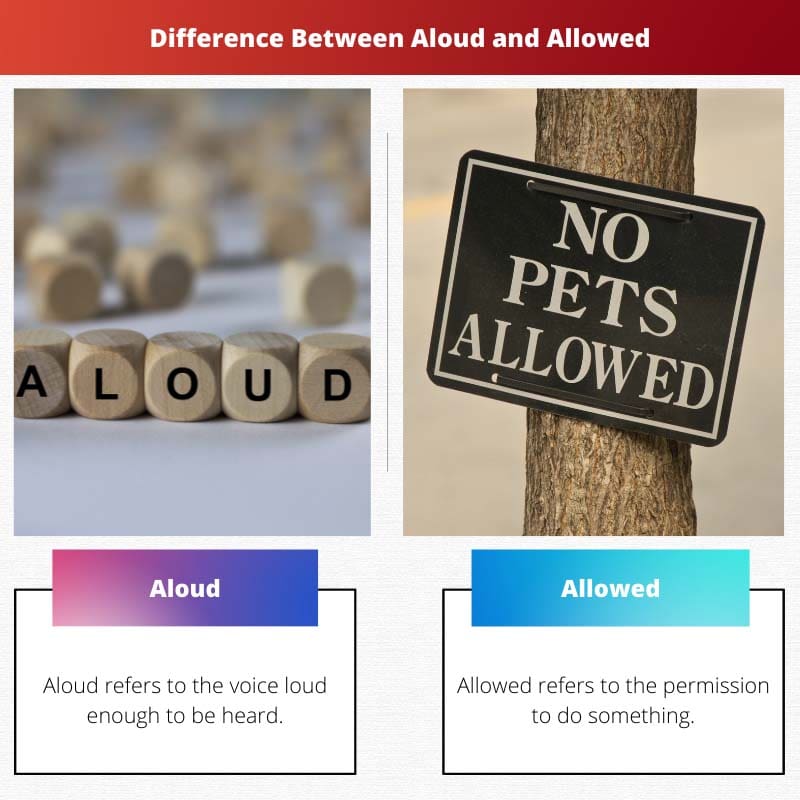Homophones are one of the most confusing words in English terminology. Aloud and allowed is a pair of homophones that confuses users of the English language.
Aloud and allowed differences in their meaning, origin, and type.
Key Takeaways
- “Aloud” is an adverb meaning to say something in a voice that can be heard, while “allowed” is the past tense of the verb “allow,” meaning to permit or authorize something.
- “Aloud” describes vocalized speech or sounds, while “allowed” pertains to giving permission or granting access.
- Example: She read the poem aloud (vocalizing) after the teacher allowed her (gave permission) to share it with the class.
Aloud vs Allowed
The difference between aloud and allowed lies in the meaning aloud refers to the voice being loud enough to be heard. In contrast, allowed is a verb that connotes permission to engage in an activity. The word aloud came into use in the late 13th century. In contrast, the word allowed came into existence in the late 14th century, referring to praise.

Aloud is an adverb that refers to a voice loud enough to be heard. For example, Ramesh read his father’s letter aloud so the entire family could hear it.
In addition, speaking aloud comes in stark contrast with whispering. For example, Seema narrated the table aloud in class.
Allowed is a verb that refers to permission to do something. For example, My mother allowed me to stay at my friend’s house tonight.
In the late 15th century, allowed came into use as a past participle and past tense of the word allow. Allowed is also used to admit or assert that something is true.
For example, Jonathan allowed that he might have been too aggressive in the past.
Comparison Table
| Parameters of Comparison | Aloud | Allowed |
|---|---|---|
| Meaning | Aloud refers to the voice loud enough to be heard. | Allowed refers to the permission to do something. |
| Type | Aloud is an adverb | Allowed is a verb. |
| Origin | The word aloud came into use in the late 13th century. | The word allowed came into existence in the late 14th century referring to praise. |
| Antonyms | Antonyms for aloud are inaudibly and silently. | Antonyms of allowed are prevent, forbid, and deny. |
| Synonyms | The synonyms of aloud are loudly, clearly, intelligibly, noisily, audibly, distinctly, lustily, out loud, and vociferously. | The synonyms of allowed are permit, authorize, let, sanction, grant, license, empower, agree, accept, concede, let, and admit. |
What is Aloud?
Aloud is an adverb that refers to a voice loud enough to be heard. For example, Ramesh read his father’s letter aloud so the entire family could hear it.
Another example of aloud in a sentence is citizens have started to wonder aloud if any economic improvements will take place.
Aloud may also have been used to connote irritable and high-pitched voices.
The word aloud came into use in the late 13th century. The initial meaning of aloud is identical to its present connotation. It refers to “with a loud noise.”
The synonyms of aloud are loudly, clearly, intelligibly, noisily, audibly, distinctly, lustily, out loud, and vociferously. Antonyms for aloud are inaudibly and silently.
Speaking aloud comes in stark contrast with whispering. For example, Seema spoke at the table aloud in class. On the other hand, Rekha was whispering to her friend.
In the sentences, there is a dissimilarity between aloud and whisper. Another example of aloud is Raven crying aloud in grief as he lost his mother two days ago.
Aloud has a practical application to connote that something was said out loud. Aloud may also serve as an adjective when it describes the tone of a person.
For instance, Reena sang out aloud so that the entire class could hear it. Thus, aloud functions both as an adverb and an adjective with multi-facet uses.

What is Allowed?
Allowed is a verb that refers to permission to do something. For example, My mother allowed me to stay at my friend’s house tonight.
Another example of allowed in a sentence is we are not allowed to wear fancy clothes in school. Allowed functions as the past tense and past participle of allow. Thus, it has various applications.
Another meaning of allowed is to regard something as acceptable in a religious or cultural environment.
For instance, Sikhism ideals allowed Rekha to practice equality and respect all religions. On the other hand, Hindu culture allowed Siya to fast for her husband’s long life.
Antonyms of allowed are prevented, forbid, and deny.
The synonyms of allowed are permitted, authorize, let, sanction, grant, license, empower, agree, accept, concede, let, and admit.
The word allowed came into existence in the late 14th century, referring to praise. In the late 15th century, allowed came into use as a past participle and past tense of the word allow.
Allowed is also used to admit or assert that something is true. For example, Jonathan allowed that he might have been too aggressive in the past.
Another use allowed in a sentence is students are not allowed to bring electronic devices into the examination hall. Thus, allowed is a verb that connotes permission to engage in an activity.

Main Differences Between Aloud and Allowed
- The word aloud came into use in the late 13th century. In contrast, the word allowed came into existence in the late 14th century, referring to praise.
- Aloud refers to a voice loud enough to be heard. In contrast, allowed is a verb that connotes permission to engage in an activity.
- Antonyms for aloud are inaudibly and silently. On the other hand, antonyms of allowed are prevented, forbid, and deny.
- The synonyms of aloud are loudly, clearly, intelligibly, noisily, audibly, distinctly, lustily, out loud, and vociferously. On the other hand, the synonyms of allowed are permitted, authorize, let, sanction, grant, license, empower, agree, accept, concede, let, and admit.
- While aloud is an adverb, allowed is a verb.

- https://www.really-learn-english.com/aloud-vs-allowed.html
- https://prowritingaid.com/grammar/1000249/Aloud-vs-allowed%E2%80%94what-is-the-difference

This article presents a clear difference between these two paronyms. This can be quite useful for English learners.
Absolutely, the author has done a good job.
I agree, when learning English, every detail counts.
It’s common for people to confuse these terms, but the article helps to clarify their differences.
The article could be a bit shorter, but it’s well-researched and informative.
I appreciate the examples provided in the text. It helps to understand the usage of these words.
I fail to see the relevance of writing a whole article about these words. Seems unnecessary.
The historical context of both words is quite interesting.